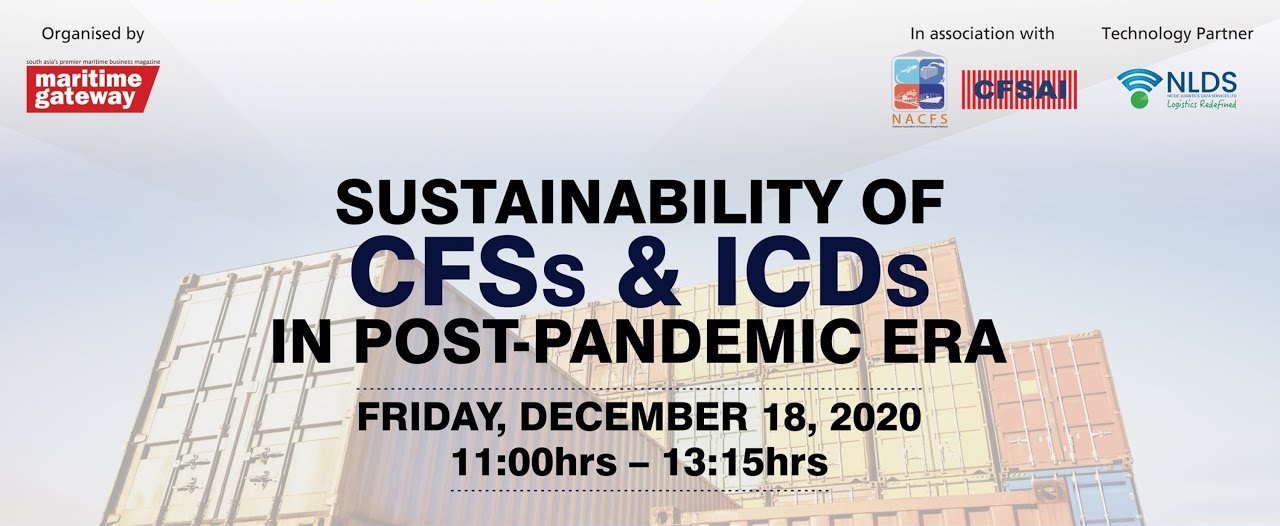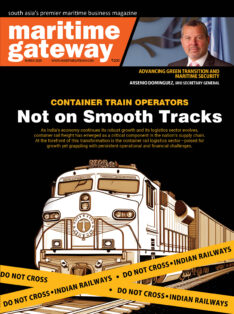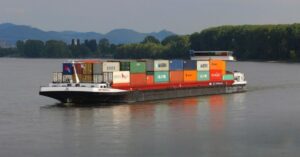The pandemic has etched deep scars into our political, business and social lives such that several business models have changed for ever, said Ramprasad, Editor-in-Chief & Publisher of Maritime Gateway, delivering his opening remarks that detailed on the role of CFSs and ICDs in growth of containerised trade of the country by leaps and bounds (around 40 times). Most of the CFS and ICDs in India are in MSME sector, located in Gujarat, Maharashtra, Tamil Nadu, West Bengal and Kerala. Due to the pandemic most of the facilities are operating at 50% capacity. It’s time the industry looks at new business opportunities and models such as offering value added services.
Welcome address
Adarsh Hegde, President, CFSAI elaborated on the evolution of the CFS and ICDs as extension of ports and their remarkable role during the lockdown in keeping the ports congestion free in spite of all odds such as rising freight rates, blanking of sailings and inventory shortage. With utilisation of CFS and ICDs declining to around 50% they should look forward to new business avenues in order to survive. Adarsh Hegde hoped that the industry in consultation with the government is able to find those new business avenues and make best use of the existing infrastructure. Towards the conclusion three businesses – JM Baxi Group, Chinubhai Kalidass & Bros. and Liladhar Pasoo Group were felicitated for completing 100 years of service.
Theme address
Pramod Kumar Srivastava, President, NACFS highlighted the common vision shared by CFSAI and NACFS – To support and enhance the CFS and ICD Infrastructure in India. Sustainability comes into question whenever there are policy changes and through this Webinar he made a submission to the government to fully utilise the infrastructure that is ready. He recommended the following points: Standard templates for exploring new avenues such as handling non-exim and coastal cargo; guidelines for allowing manufacturing unit in a bonded warehouse under Section65; a clarification on cost recovery policy; nationwide adaption of un-cleared cargo software; digitalisation of infrastructure at CFSs for their better utilisation. With the talent and skills that CFS and ICDs operators have they will evolve and adapt to the new normal, hoped Pramod Kumar.
Keynote address
M G Thamizh Valavan, IRS, Commissioner (Investigation-Customs), Central Board of Indirect Taxes and Customs, Department of Revenue, Ministry of Finance, Government of India, made a note that the industry was functioning on the policy drafted in 1992 and a new policy was long overdue which has been released through circular 50 of 2020 by the board. The new policy has been drafted keeping in mind the shortcomings of the old policy such as infrastructure requirements for granting permission for CFS, monitoring their performance and the need for clarity on de-notification.
Anant Swarup, IRPS, Joint Secretary (Logistics), Department of Commerce, Ministry of Industry and Commerce, Government of India, emphasised that change is the only constant and businesses should adapt to new dynamics brought into the system. The value proposition that CFS and ICDs offer to the shippers will decide their survival. There is a talk making the rounds that in future Customs may not be required to be present at CFS/ICDs and will be functional at the ports and airports.
Taking forward from the point mentioned by M G Thamizh Valavan, V Kalyana Rama, IRTS, CMD, CONCOR, said, in future there may not be any requirement of Customs and that’s where we are leading to. The market is moving from brick and mortar to e-commerce but the goods will still need to be delivered to the customer. CFS over a period of time, rather than developing as a logistics facility started acting more as customs clearance facility and this is where the problem arises today. Unless the customer gets logistics value it will consider CFSs as Customs clearance points only. The future of CFS and ICDs depends on how fast they can become logistics enablers for the industry?
Panel discussion one – Reengineering business model
Dinesh Lal, Director, AMI India Logistics Pvt Ltd, moderator of the session, gave a flash back into the origins of CFS and the current need to reorganise their business model to keep them profitable in future. Capt. Deepak Tweari, Chairman, CSLA, said the future of CFS and ICDs needs to be looked at in totality by considering both domestic and Custom bonded areas for handling domestic and exim cargo and also allowing value added activities. Regulations should facilitate such changes swiftly.
CFS and ICDs are ready to take up value added services which means there is a huge transformation in the business model coming their way, said Shantanu Bhadkamkar, President, AMTOI. At the same time he called for less interference from the government leaving the business to be decided by market forces. Being specialised in handling a particular commodity will be more important than having mere infrastructure. AMTOI is ready to work with CFSs for evolving new business models, he said.
Endorsing the views of Capt. Deepak Tewari, Sanjay Swarup, Director International Marketing, CONCOR, said we have to reengineer our product according to the demand of the market. At CFS and ICDs customer is looking for value addition to their cargo. CONCOR in the past 4 years has focused at strengthening first and last mile connectivity, warehousing, offering solutions on mobile for continuous cargo visibility, which is a major value addition.
Currently we see CFS getting concentrated in certain clusters, about 34 CFS are present around JNPT, so the business that offers the best service at optimum cost will survive, opined Dr. Pramod Sant, Vice President – Export Import & Customs, Semens Ltd. Talking about value added services, he said, when the value addition offered is higher than the price at which it is offered then customers will jump at such services.
Capt. Girish Munjal, Vice President, Aquarius Services, made a detailed presentation on hazardous cargo and safety issues at CFS and ICDs. The presentation focused on improvement opportunities for handling dangerous goods at CFS and ICDs in light of some of the accidents that have happened and the importance of safety inspections.
Panel discussion two – Facilitating through policy initiatives
With digitalisation, AI, big data being used in a lot of business processes, including those of Customs, the business model of CFSs needs to be relooked upon, said Capt. Sandeep Mehta, President, Business Development, APSEZ, (moderator of the session) in his opening remarks.
Unmesh Sharad Wagh, IRS, Deputy Chairman, JNPT, lauded the efforts of CFS surrounding his major port for timely clearance of cargo during the lockdown, due to which JNPT never chocked. DPD and DPE for the time being give this impression that business of CFSs may reduce but that is not the case, he emphasised. JNPT has current capacity of 7.5 million teus, which will increase to 10 million teus in future (70-80% capacity utilised) and this will bring ample business to the CFSs, argued Unmesh Sharad Wagh.
There has to be a uniform policy by the government across the country for DPD, remarked Ashutosh Jaiswal, President, International Division & Logistics Business, Century Plyboards (I) Ltd. Coming to value addition, 80% of importers are not interested in any value addition, their only focus is to reduce cost. Most of the exporters are interested into value addition and this is where CFSs need to focus.
If exports of India do not rise then there will be a serious impact on the business of CFS and ICDs with some of them becoming NPAs over the years, cautioned Tarlochan Singh Ahluwalia, President, NISA. There has to be a serious concerted effort to increase the exports of our country which have remained stagnant for the past 9 years.
The need of the hour is not sustainability but reengineering the business model of CFS, said Surajit Sarkar, Chief Operating Officer, NICDC Logistics Data Services Ltd. Logistics has been a vital link for business and technology has made it smarter by increasing speed, visibility and transparency, thereby reducing the turnaround time and logistics cost. Towards the conclusion, Umesh Grover, Secretary General, CFSAI summed up the discussion – CFSs in order to survive have to venture into alternate means of business such as handling domestic cargo, e-commerce, offering value added services such as warehousing, MMLP. Government policies should facilitate in reducing the time, cost of business and facilitating ease of doing business.












